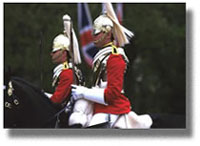Course Summary
This writing intensive course introduces you to modern
literature of Great Britain by giving you the historical and cultural
context of its evolution. You will study major authors in poetry,
drama and fiction. You will read many works in their entirety and
some in excerpted form. By the end of the course, you will be familiar
with the major periods of British literature in modern times. You
will know which writers have had the greatest influence on British
literature and why.
Course Objectives
This course will help you to achieve competence in your efforts
to:
-
practice clear communication
-
acquire a vocabulary for discussing literature
-
read perceptively
-
ask questions that will help you to write about literature
-
notice the integration of literary form and content
-
appreciate the sound of poetry by hearing works read in class
and on-line
-
know the names of major British authors and when they wrote
-
recognize the major stages in the development of the English
language
-
distinguish the features of early periods of English literature
-
enhance your rhetorical awareness by teaching you to recognize
tone and diction
-
learn how to find and use reliable reference works
-
master the use of a historical dictionary
Assessing Your Competencies
The course will give you these opportunities to see your own progress:
-
Discussions in every class will allow you to make known your
point of view.
-
Frequent quizzes will help you to keep up with reading assignments.
-
Your commonplace book (electronic assignment) will record your
reactions
-
On-line research assignments will let you see the ways in which
literature is studied
-
Written assignments will give you practice in articulating
your thoughts.
Expectations
I expect you to come to class and to take that obligation
as seriously as you would with any other job you might have. While
you are enrolled at Champlain College, being a student is your job.
When you come to class, I expect you to have already done the reading
assigned for that day and to be ready to say something about it.
The success of the entire course depends on how conscientiously
you prepare. Part of your education in this course includes learning
how to listen to other students, both out of curiosity and out of
courtesy. In addition to reading assignments and papers, you will
also be asked to submit some written work electronically. I expect
you to know how to attach a document to an e-mail message and to
send it. Every student at Champlain College is given a free e-mail
account. If you have not yet set yours up, and you have no other
e-mail available, then I expect you to go to the Help Desk and establish
your free account. Another kind of help available to you is my help
with your written assignments. I do not accept late assignments.
Attendance
Every student is allowed to be absent twice during the
entire semester, without any excuse. Any additional absences will
diminish your course grade. See The Rudder for college policy on
excessive absences.On returning to class after an absence, you are
responsible for any assignment made during your absence. You must
turn in any work due the day of your return.
Texts
Abrams, M.H. et al., The Norton Anthology of English
Literature .7th ed. Vol. I New York: Norton, 2000.
Hacker, Diana. A Pocket Manual of Style. 3rd ed. New York:
Bedford, 2000. A collegiate dictionary
Course Grade
Most of your grade in this course is based on the writing
that you do about what you read. That grade is calculated according
to the following proportions:
Class participation
(attendance, paying attention, listening, speaking voluntarily)
|
10% |
Commonplace book
(electronic assignment) |
10% |
| Mid-term examination |
20% |
| Papers |
40% |
| Final examination |
20% |
|

